-
 Bitcoin
Bitcoin $85,620.5431
0.86% -
 Ethereum
Ethereum $1,897.3122
-0.11% -
 Tether USDt
Tether USDt $1.0002
0.02% -
 XRP
XRP $2.1269
0.07% -
 BNB
BNB $601.9446
-1.02% -
 Solana
Solana $129.2221
2.97% -
 USDC
USDC $0.9999
-0.01% -
 Dogecoin
Dogecoin $0.1725
0.66% -
 Cardano
Cardano $0.6822
1.06% -
 TRON
TRON $0.2380
0.58% -
 Toncoin
Toncoin $3.9628
-1.77% -
 Chainlink
Chainlink $13.8245
-1.78% -
 UNUS SED LEO
UNUS SED LEO $9.4229
0.68% -
 Stellar
Stellar $0.2688
-1.15% -
 Sui
Sui $2.4659
2.25% -
 Avalanche
Avalanche $19.2191
-0.67% -
 Shiba Inu
Shiba Inu $0.0...01259
-0.08% -
 Hedera
Hedera $0.1738
2.43% -
 Litecoin
Litecoin $85.8036
1.94% -
 Polkadot
Polkadot $4.1113
-0.65% -
 MANTRA
MANTRA $6.4509
2.66% -
 Bitcoin Cash
Bitcoin Cash $307.3141
-0.43% -
 Bitget Token
Bitget Token $4.5887
-0.44% -
 Dai
Dai $0.9996
-0.05% -
 Ethena USDe
Ethena USDe $0.9999
0.00% -
 Pi
Pi $0.6755
-4.64% -
 Hyperliquid
Hyperliquid $13.5037
1.72% -
 Monero
Monero $220.7326
1.83% -
 Uniswap
Uniswap $6.2125
-0.90% -
 Aptos
Aptos $5.3963
0.94%
How to safely create a Bitcoin wallet address
Bitcoin wallets store private keys, not Bitcoin; addresses are public for receiving funds, while private keys must be kept secret to prevent permanent loss of access.
Mar 30, 2025 at 11:14 pm
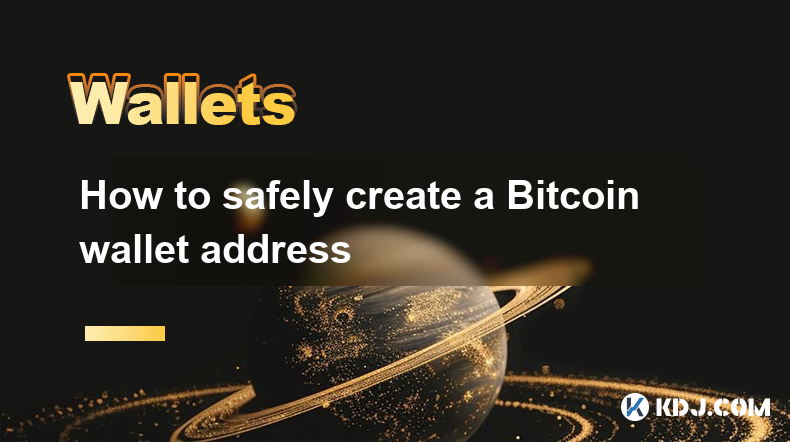
Understanding Bitcoin Wallet Addresses
A Bitcoin wallet doesn't actually store your Bitcoin. Instead, it stores your private keys, which are cryptographic codes that grant you access to your Bitcoin. Your Bitcoin wallet address, on the other hand, is a publicly visible string of characters that others can use to send you Bitcoin. Think of it like your bank account number – you give it to people to receive money, but your private key is like your PIN, which you must keep secret. Losing your private key means losing access to your Bitcoin permanently.
Choosing the Right Type of Bitcoin Wallet
Several types of Bitcoin wallets exist, each with its own security implications. The choice depends on your technical skills and security needs.
Software wallets: These are applications installed on your computer or mobile device. They offer varying levels of security depending on the specific software and its features. Popular options include Electrum and Exodus. Remember to download only from official sources to avoid malware.
Hardware wallets: These are physical devices that store your private keys offline. They are generally considered the most secure option, as they protect your keys from malware and online attacks. Examples include Ledger and Trezor. Always verify the authenticity of your hardware wallet before use.
Web wallets: These are online services that manage your Bitcoin for you. They are convenient but generally less secure than software or hardware wallets because they are accessible through the internet. Only use reputable web wallets with strong security features and a good track record.
Paper wallets: These involve printing your public and private keys on paper. While offering excellent security when stored properly, they are less convenient for regular transactions. Store your paper wallet in a safe, secure location, away from moisture and damage.
Step-by-Step Guide to Creating a Bitcoin Wallet Address (Software Wallet Example)
This example uses a hypothetical software wallet. The specific steps may vary depending on the wallet you choose. Always consult the official documentation of your chosen wallet.
Download and Install: Download the software wallet from the official website. Verify the authenticity of the download using checksums or other verification methods provided by the developer.
Create a New Wallet: Launch the software and follow the on-screen instructions to create a new wallet. You will likely be asked to create a strong password. Choose a strong, unique password that you won't forget. Use a password manager if needed.
Backup Your Seed Phrase: The software will generate a seed phrase (a list of words). This is crucial! Write down your seed phrase on paper and store it in a safe, secure location. Never store it digitally. Losing your seed phrase means losing access to your Bitcoin.
Receive Your Wallet Address: Once the wallet is set up, you'll see your Bitcoin wallet address. This is the address you'll give to others to send you Bitcoin.
Verify Your Address: Before using the address, double-check that it's correct. A single wrong character can result in lost funds.
Security Best Practices for Your Bitcoin Wallet
Strong Passwords: Use strong, unique passwords for all your wallets and accounts.
Regular Software Updates: Keep your software wallets updated to the latest version to benefit from security patches.
Antivirus Software: Use reputable antivirus software on your computer to protect against malware.
Two-Factor Authentication (2FA): Enable 2FA whenever available to add an extra layer of security.
Offline Storage: For long-term storage, consider using a hardware wallet or paper wallet to keep your private keys offline.
Multiple Wallets: Consider using multiple wallets to separate funds for different purposes.
Understanding Private Keys and Public Keys
Your Bitcoin wallet holds two crucial cryptographic keys:
Private Key: This is a secret code that proves your ownership of the Bitcoin. Never share your private key with anyone.
Public Key: This is derived from your private key and is used to generate your Bitcoin address. It's safe to share your public key (your Bitcoin address).
What if I lose my private key?
If you lose your private key, you lose access to your Bitcoin. There is no recovery process. The importance of securely backing up your seed phrase cannot be overstated.
Frequently Asked Questions
Q: Is it safe to use a web wallet?
A: Web wallets are convenient but generally less secure than software or hardware wallets due to their online nature. Use only reputable web wallets with strong security features.
Q: What is a seed phrase?
A: A seed phrase is a list of words that acts as a backup for your private keys. It's crucial to write it down securely and keep it safe.
Q: How do I choose a secure Bitcoin wallet?
A: Consider your technical skills and security needs. Hardware wallets are generally the most secure, while software wallets offer a balance of security and convenience. Web wallets are the least secure option.
Q: What should I do if I suspect my wallet has been compromised?
A: Immediately change your passwords, secure your seed phrase, and contact the wallet provider's support if applicable. Monitor your transactions closely.
Q: Can I recover my Bitcoin if I lose my wallet?
A: If you lose your private key or seed phrase, you cannot recover your Bitcoin. This highlights the importance of securely storing your backup.
Q: Are all Bitcoin wallets the same?
A: No, Bitcoin wallets vary significantly in their security features, user interfaces, and functionality. Research different options before choosing one.
Q: How often should I back up my wallet?
A: Back up your wallet immediately after creating it and regularly thereafter. The frequency depends on how often you use your wallet and how much Bitcoin you hold. Consider backing up your seed phrase at least once a month.
Disclaimer:info@kdj.com
The information provided is not trading advice. kdj.com does not assume any responsibility for any investments made based on the information provided in this article. Cryptocurrencies are highly volatile and it is highly recommended that you invest with caution after thorough research!
If you believe that the content used on this website infringes your copyright, please contact us immediately (info@kdj.com) and we will delete it promptly.
- DoubleZero Protocol Launches Validator Funding Round, Targeting Existing Solana, Celestia, Sui, Aptos, and Avalanche Validators
- 2025-04-03 05:05:12
- This Classic Chart Pattern Could Send SUI Price Soaring: Expert Reveals the Key Level
- 2025-04-03 05:05:12
- Bitcoin Pepe (BPEP) is rewriting the rules of DeFi
- 2025-04-03 05:00:14
- The NFT marketplace X2Y2 is indeed scheduled to shut down its operations on April 30, 2025
- 2025-04-03 05:00:14
- Bitcoin's History During Market Turmoil Does Not Necessarily Encourage Its Chances of Success This Time
- 2025-04-03 04:55:12
- Bitcoin (BTC) price rallies by 5.53% as spot bids drive the market's bullish start to Q2
- 2025-04-03 04:55:12
Related knowledge
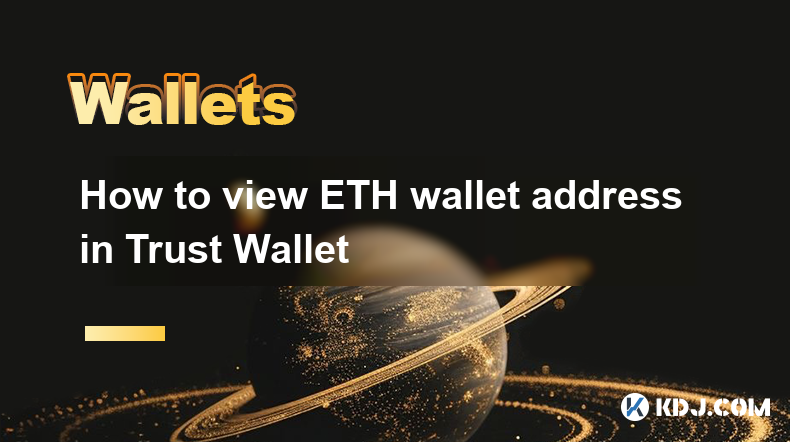
How to view ETH wallet address in Trust Wallet
Apr 02,2025 at 10:56pm
Managing your Ethereum (ETH) wallet address is crucial for anyone involved in the cryptocurrency space, especially when using popular mobile wallets like Trust Wallet. This guide will walk you through the process of viewing your ETH wallet address in Trust Wallet, ensuring you can confidently engage in transactions, receive funds, and manage your digita...
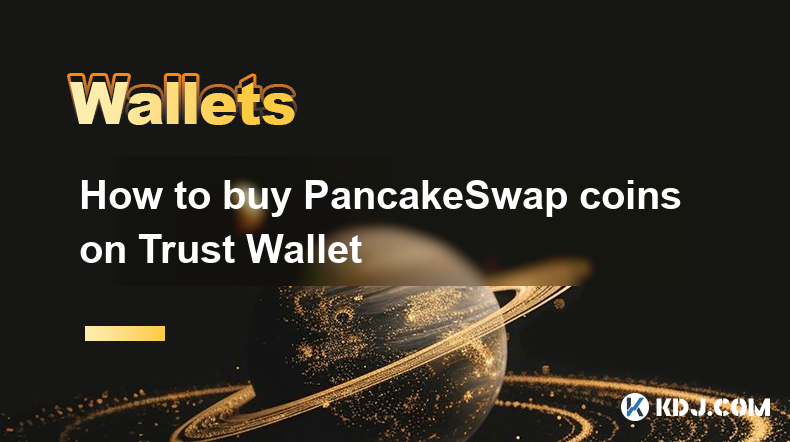
How to buy PancakeSwap coins on Trust Wallet
Apr 03,2025 at 12:28am
Buying PancakeSwap coins (CAKE) on Trust Wallet involves a few straightforward steps. Trust Wallet is a popular mobile wallet that supports a wide range of cryptocurrencies, including CAKE. To begin, you'll need to download and set up Trust Wallet on your mobile device. Once installed, you can easily purchase CAKE directly within the app using various p...
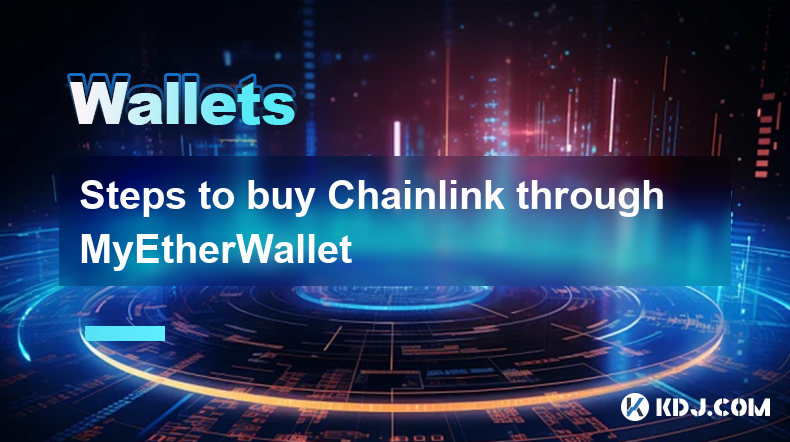
Steps to buy Chainlink through MyEtherWallet
Apr 03,2025 at 01:07am
To buy Chainlink (LINK) through MyEtherWallet (MEW), you need to understand the process and tools involved. MyEtherWallet is a popular online interface that allows you to interact with the Ethereum blockchain. Chainlink, on the other hand, is an Ethereum-based token that powers a decentralized oracle network. To purchase LINK using MEW, you will need to...
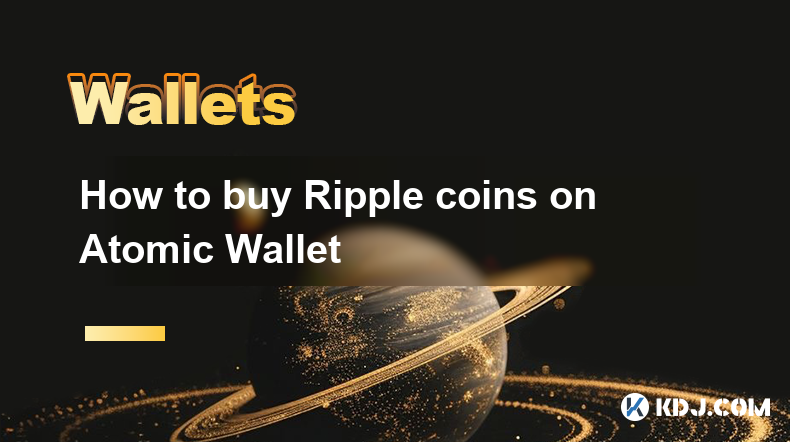
How to buy Ripple coins on Atomic Wallet
Apr 03,2025 at 03:00am
Buying Ripple (XRP) coins on Atomic Wallet is a straightforward process that allows you to manage your cryptocurrency securely. Atomic Wallet is a decentralized, multi-asset wallet that supports over 300 cryptocurrencies, including Ripple. To get started, you'll need to download the Atomic Wallet application, set up your wallet, and then proceed to buy ...
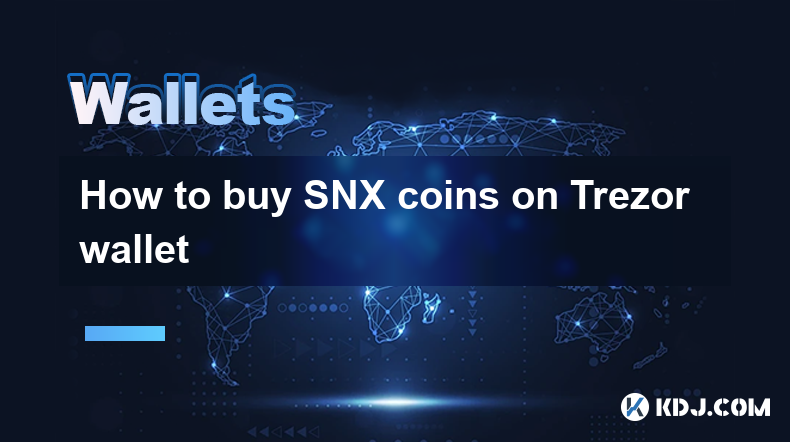
How to buy SNX coins on Trezor wallet
Apr 02,2025 at 10:00pm
Buying SNX coins, also known as Synthetix Network Tokens, using a Trezor hardware wallet involves several steps to ensure secure and efficient transactions. Trezor wallets are renowned for their security features, making them an excellent choice for storing and managing cryptocurrencies like SNX. In this guide, we will walk you through the process of pu...
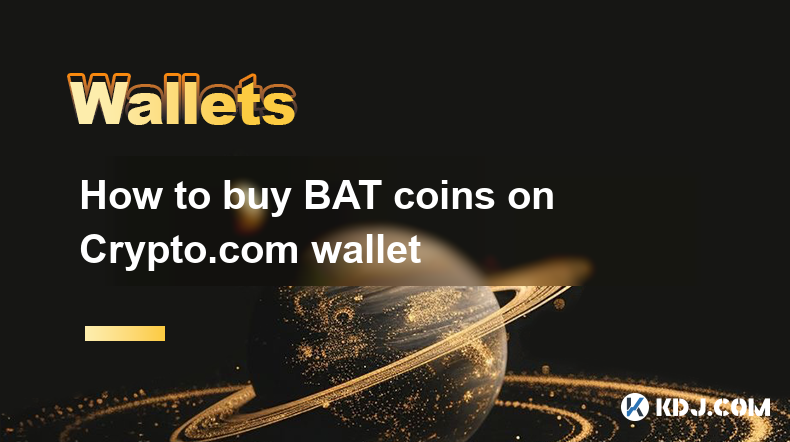
How to buy BAT coins on Crypto.com wallet
Apr 03,2025 at 04:57am
Buying Basic Attention Token (BAT) coins on the Crypto.com wallet is a straightforward process that can be completed in a few steps. BAT is a cryptocurrency designed to reward users for their attention while browsing the web, and it's used primarily within the Brave browser ecosystem. To start, you'll need to set up a Crypto.com account and wallet if yo...

How to view ETH wallet address in Trust Wallet
Apr 02,2025 at 10:56pm
Managing your Ethereum (ETH) wallet address is crucial for anyone involved in the cryptocurrency space, especially when using popular mobile wallets like Trust Wallet. This guide will walk you through the process of viewing your ETH wallet address in Trust Wallet, ensuring you can confidently engage in transactions, receive funds, and manage your digita...

How to buy PancakeSwap coins on Trust Wallet
Apr 03,2025 at 12:28am
Buying PancakeSwap coins (CAKE) on Trust Wallet involves a few straightforward steps. Trust Wallet is a popular mobile wallet that supports a wide range of cryptocurrencies, including CAKE. To begin, you'll need to download and set up Trust Wallet on your mobile device. Once installed, you can easily purchase CAKE directly within the app using various p...

Steps to buy Chainlink through MyEtherWallet
Apr 03,2025 at 01:07am
To buy Chainlink (LINK) through MyEtherWallet (MEW), you need to understand the process and tools involved. MyEtherWallet is a popular online interface that allows you to interact with the Ethereum blockchain. Chainlink, on the other hand, is an Ethereum-based token that powers a decentralized oracle network. To purchase LINK using MEW, you will need to...

How to buy Ripple coins on Atomic Wallet
Apr 03,2025 at 03:00am
Buying Ripple (XRP) coins on Atomic Wallet is a straightforward process that allows you to manage your cryptocurrency securely. Atomic Wallet is a decentralized, multi-asset wallet that supports over 300 cryptocurrencies, including Ripple. To get started, you'll need to download the Atomic Wallet application, set up your wallet, and then proceed to buy ...

How to buy SNX coins on Trezor wallet
Apr 02,2025 at 10:00pm
Buying SNX coins, also known as Synthetix Network Tokens, using a Trezor hardware wallet involves several steps to ensure secure and efficient transactions. Trezor wallets are renowned for their security features, making them an excellent choice for storing and managing cryptocurrencies like SNX. In this guide, we will walk you through the process of pu...

How to buy BAT coins on Crypto.com wallet
Apr 03,2025 at 04:57am
Buying Basic Attention Token (BAT) coins on the Crypto.com wallet is a straightforward process that can be completed in a few steps. BAT is a cryptocurrency designed to reward users for their attention while browsing the web, and it's used primarily within the Brave browser ecosystem. To start, you'll need to set up a Crypto.com account and wallet if yo...
See all articles
























































































